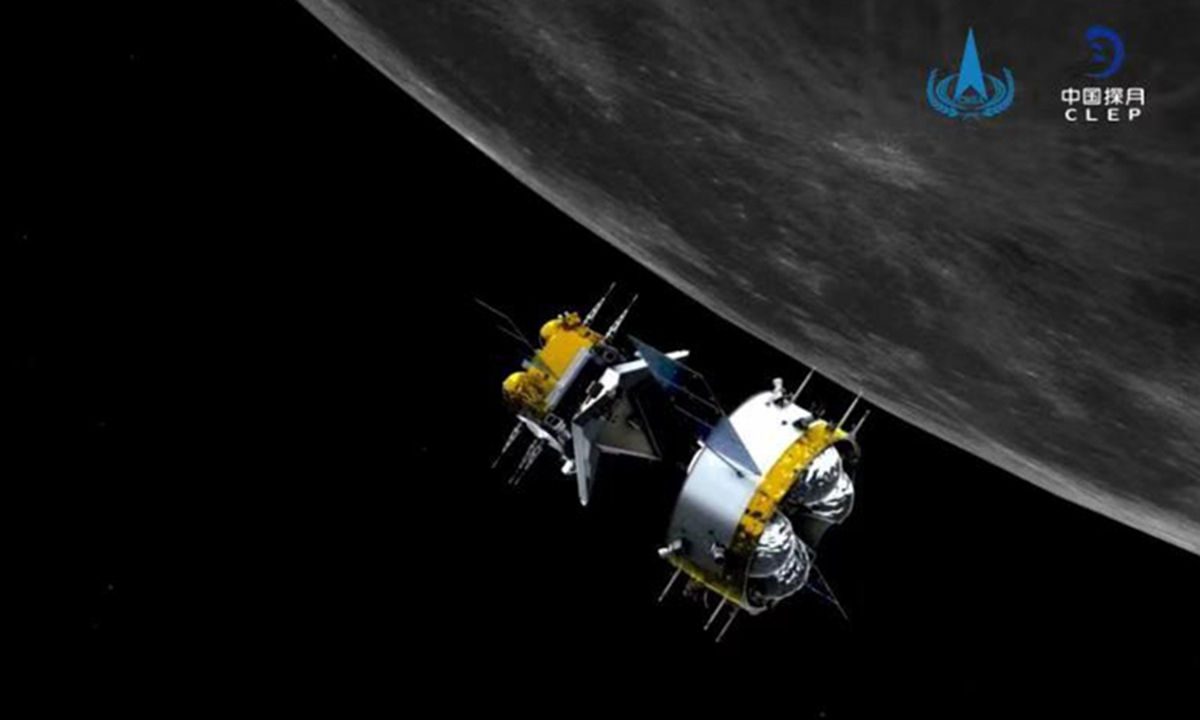
Image released by the China National Space Administration (CNSA) shows the orbiter-returner combination of China's Chang'e-5 probe approaching the ascender. Photo: Xinhua
NASA chief Bill Nelson has freshly warned of a new "space race" with China, claiming that China wants to "occupy the moon" citing the lunar research base that China and Russia are co-building, which he is "very concerned about." Experts noted that Nelson's remarks, following a series of similar accusations, does not represent the majority of the space community in the US, as they still want to seek cooperation with China in the field, an attempt that has been sadly limited by the US' own laws.
In an interview with BILD published on Saturday, Nelson said that he is not comfortable with the moon base that China and Russia are setting up. "We have to be very concerned about China landing on the moon and saying: It's ours now, and you stay out."
The senior US official is pointing at an International Lunar Research Station that China and Russia are jointly developing, which is expected to become operational by 2035, enabling experimental and research facilities for a wide range of scientific work to operate in lunar orbit.
Nelson further alleged that China's space program is "a military space program." When asked what purposes could China pursue in space, Nelson answered: "Well, what do you think is happening on the Chinese space station? They're learning how to destroy other people's satellites."
This is not the first time the NASA chief has lashed out at China's space progress. Earlier in May, Nelson alleged that China is "good at stealing" American designs in a "space race," which has been slammed by Chinese observers as "ridiculous" and "outrageous" as China's space program has totally relied on its own abilities and is walking a pace suited to its own development agenda.
In April, he accused China of continuing to display a lack of transparency and willingness to cooperate with the US and other countries in space. Earlier he said in a press conference at the Kennedy Space Center in Florida that "we want cooperation that has not been forthcoming from the Chinese government [but] it takes two to tango."
However, the absence of cooperation between China and the US is not a result of unwillingness of the Chinese side, but an act that the US enforced on itself - the Wolf Amendment passed in 2011, which essentially prohibits any direct cooperation between NASA and its Chinese counterparts.
"Lacking strong expertise and overall understanding of global aerospace developments, Nelson behaves more like a politician that has been deeply influenced by the frictions between the two countries in recent years, as he repeatedly preaches the so-called China threat theory in this field," Huang Zhicheng, a Chinese expert on aerospace science and technology, told the Global Times on Sunday.
"However, several former NASA chiefs have expressed their dissatisfaction over the Wolf Amendment which limits their cooperation with China. So do the majority of US researchers in this field including NASA officials, who are willing to see more interactions with China in space," Huang noted. "The majority of academicians across the world still wish for the successful construction of China's lunar base."
China and Russia have repeatedly stressed, on various occasions, that the lunar outpost the two sides are building will be an "open and inclusive" one, emphasizing the peaceful use of outer space and that the project welcomes all international partners interested in the cooperation.
In contrast with the US lunar exploration project known as the "Artemis Accords," which experts believe reveals its "exclusive nature for mimicking a space-based NATO," China and Russia's partnership stresses bringing advancement for all, with the vision of building a community with a shared future for mankind.
There is no need to make comparisons or even describe it as a "space race" when it comes to the space programs of the US and China, experts said.
The Artemis 1, the first mission of NASA's Artemis program, has recently wrapped up a hard-won "wet dress rehearsal," a crucial series of tests and simulations designed to help determine a vehicle's readiness for flight, after several delays thwarted by technical issues, according to space.com, a professional news website which tracks aerospace developments.
The mission, which is eyeing a launch date in late August or early September, will send an uncrewed spacecraft on a roughly month-long journey around the moon, which aims to establish a sustainable human presence on and around the moon by the end of the 2020s, the report said.
China has made major progress in building its aerospace capability and has roughly caught up with the US in some areas, which could put pressure on the US. However, China, as always, admits that there is still a long way to go, especially in deep-space explorations such as moon and Mars landing projects, Huang noted.
Observers urged the NASA chief to stop playing with a Cold War mentality in the space field, which could only damage both countries' interests in the long term.
Chinese Foreign Ministry spokesperson Zhao Lijian previously said at a press conference that the US has been "weaving a narrative about the so-called threat posed by China and Russia in outer space in an attempt to justify its own military buildup to seek space hegemony." It is just another illustration of how the US clings on to the Cold War mentality and deflects responsibility, when it is the US that represents the top threat to security in outer space, Zhao said.




